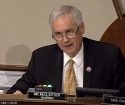Washington D.C. — At the Subcommittee on Rules and Organization of the House, Congressman Tom McClintock gave testimony about the dangers of the growing trillion dollar debt.
McClintock states, “The interest costs on that debt are eating us alive – $255 billion this year that will accomplish nothing more than to rent the money we’ve already spent. The Congressional Budget Office warns that within six years, our interest costs will exceed what we are currently spending on the entire defense budget.”
McClintock points out Congress adopted a budget that “pointed us back to balance by 2024,” but he adds, “we had to stay that course, and we haven’t. The budget now awaiting House action doesn’t balance until 2026 – and only then if we are able to summon the discipline to stick to these new numbers.”
McClintock brings up another problem, $1 trillion in spending that Congress does not directly control. He says, “That’s mainly entitlement programs like food stamps, Obamacare, Medicaid. This spending is exploding. The only way to control it is to change the underlying laws, something that today’s divided government makes virtually impossible.”
McClintock proposes two alternatives, first to control mandatory spending through the same appropriations process that controls discretionary spending by changing Rule XXI, Clause 2(b) that forbids any changes to mandatory spending in an appropriations bill. Second he proposes to gradually revive enforcement of the 1837 House Rule XXI clause 2(a), which he says is the mechanism that forces Congress to periodically review the one third of the discretionary spending that goes to authorized programs that have expired. In addition he proposes that appropriations bills include statutory adjustments to mandatory spending necessary to keep them within the enacted budget.
For the details on the two reforms and a rough outline of how McClintock says the debt breaksdown read his newest blog here.


